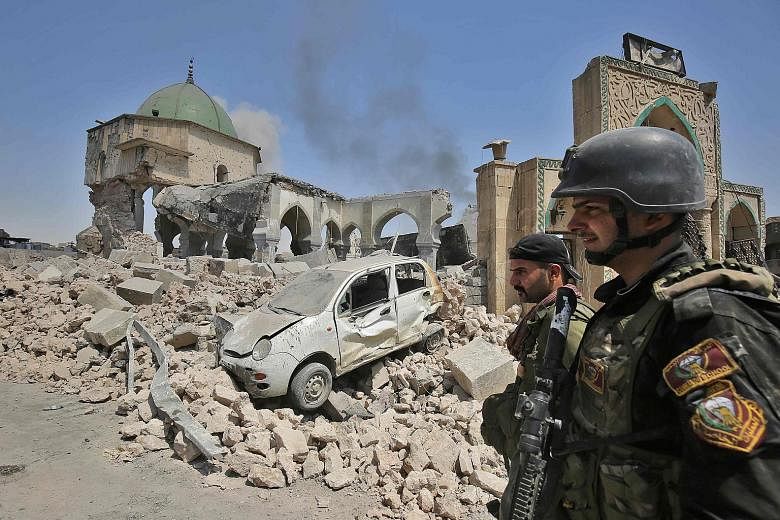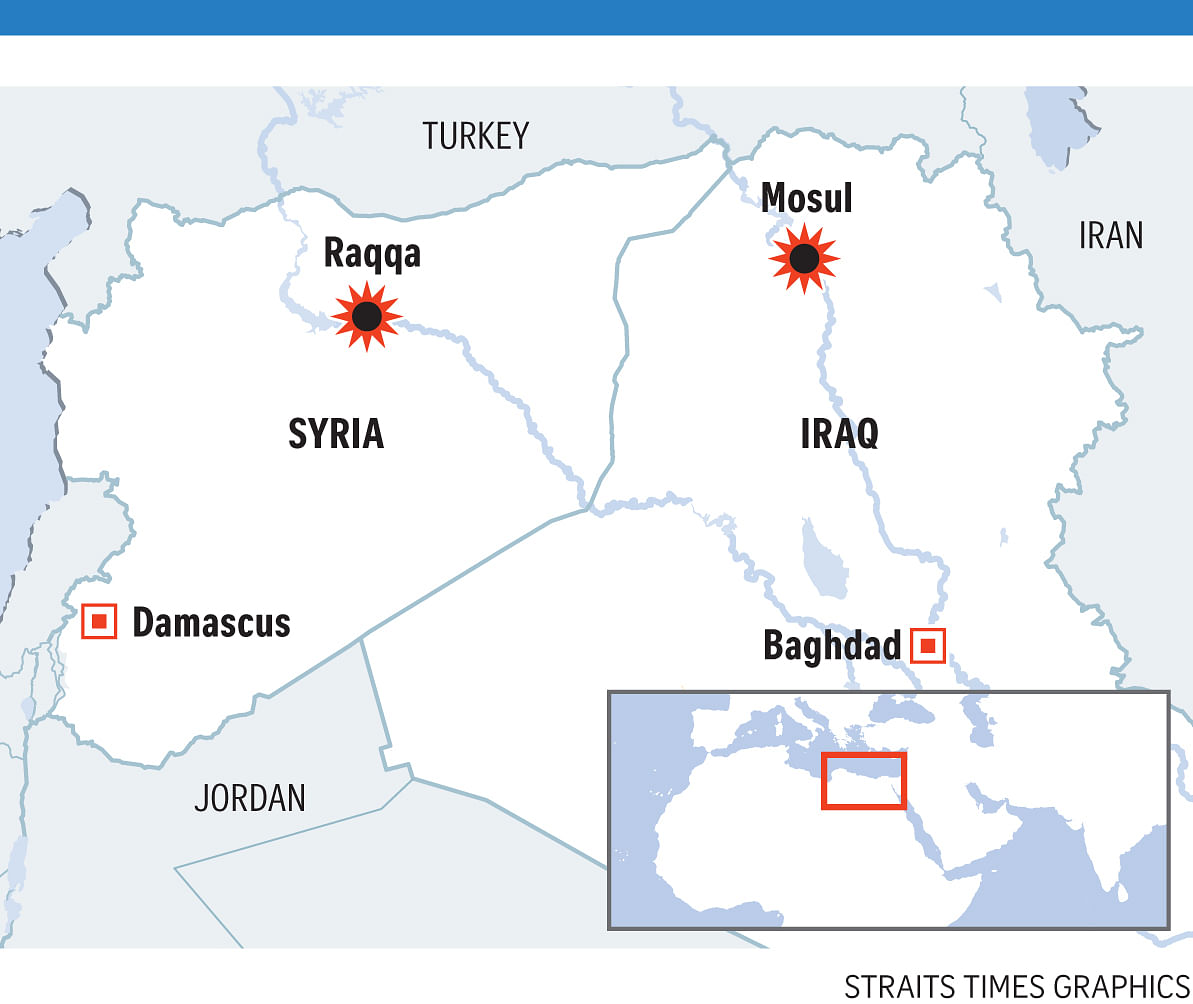BEIRUT • Militant group Islamic State in Iraq and Syria (ISIS) was under intense pressure yesterday as it took back part of its territory in its de facto Syrian capital Raqqa amid heavy fighting.
The militants recaptured an eastern district, a monitor said, rolling back the advance of United States-backed fighters.
"ISIS fully retook Al-Senaa, which was the most important neighbourhood taken by the Syrian Democratic Forces (SDF)," said Mr Rami Abdel Rahman, who heads the Syrian Observatory for Human Rights. "ISIS fighters attacked the SDF with suicide bombers and (weaponised) drones, and also used tunnels," he told Agence France-Presse.
The densely built-up neighbourhood was the closest that the SDF and allied Arab fighters, known as the Elite Forces, had come to the city centre.
On Thursday, dozens of militants disguised in SDF uniforms launched an attack on Al-Senaa from the city centre, carrying out three suicide car bomb attacks and overrunning six SDF positions.
Yesterday, the SDF and its allies withdrew from Al-Senaa to the adjacent neighbourhood of Al-Meshleb.
"They are now reinforcing their defensive positions in Al-Meshleb," Mr Abdel Rahman said.
An ISIS statement published on social media early yesterday said its fighters had been locked in "hours-long" clashes with the SDF in Al-Senaa and Al-Meshleb.
The SDF broke into Raqqa on June 6 after spending months chipping away at militant territory around the city.
With the loss of Al-Senaa, the SDF is left in control of Al-Meshleb and two districts in the west of the city.
On Thursday, the SDF cut off the last escape route for ISIS from Raqqa, trapping the besieged militants.
Around 2,500 militants are fighting inside Raqqa, according to British Major-General Rupert Jones, a deputy commander of the US-led coalition backing the SDF.
-
Key dates in rise and fall of ISIS
-
April 2013: Islamic State of Iraq and the Levant (ISIL) is created.
January 2014: ISIL conquers city of Raqqa in northern Syria.
June 2014: ISIL seizes Iraq's second city, Mosul. Later that month, ISIL declares a "caliphate" across the territory it has seized in Iraq and Syria. It rebrands itself as Islamic State in Iraq and Syria (ISIS) and declares Abu Bakr al-Baghdadi its "caliph".
August 2014: United States warplanes strike ISIS positions in northern Iraq in response to an appeal from Baghdad.
September 2014: The US forms an international coalition to defeat ISIS. Together with Arab allies, it launches air strikes on ISIS in Syria.
January 2015: ISIS is driven out of Syrian border town Kobane.
March 2015: Iraq announces the "liberation" of Tikrit, which had been under ISIS control for nearly 10 months.
February 2016: The Sunni town of Ramadi, capital of Anbar province, is recaptured from ISIS militants who had overrun it the previous May.
June 2016: Iraqi forces recapture Fallujah.
October 2016: Iraqi forces, backed by US-led air support, take eastern Mosul from ISIS.
February 2017: The Turkish army takes full control of the northern town of Al-Bab, the last ISIS bastion in Syria's Aleppo province.
March 2017: Syrian troops, backed by Russian jets, complete the recapture of the historic city of Palmyra from ISIS.
June 2017: Iraqi forces recapture iconic Mosul's Nuri mosque.
The Syrian Democratic Forces enter Raqqa and have since seized a quarter of the city.
AGENCE FRANCE-PRESSE
ISIS no longer has a presence in Syria's south-eastern Aleppo province after withdrawing from a series of villages where regime forces were advancing, Mr Abdel Rahman said yesterday.
"ISIS withdrew from 17 towns and villages, and is now effectively outside of Aleppo province after having a presence there for four years," he said.
ISIS is also under pressure in Mosul, its last major Iraqi bastion.
Iraqi forces announced the recapture of an iconic mosque on Thursday, prompting Iraqi Prime Minister Haider Al-Abadi to declare "the end" of the "fake" militant state.
The government forces yesterday attacked ISIS' remaining redoubt in Mosul's Old City. Dozens of civilians fled in the direction of the Iraqi forces, mostly women and children, some wounded by insurgents' fire.
The militants are now confined to a small area of the Old City, but its narrow streets and the presence of civilians has made the operation to retake it perilous.
The battles ahead will be difficult as most of the militants are foreigners expected to fight to the death.
Still, Staff Lieutenant-General Abdulghani Al-Assadi, a senior commander in Iraq's elite Counter-Terrorism Service, said he expects its forces to announce victory over ISIS in Mosul in the "next few days".
Meanwhile, ISIS has lost more than 60 per cent of its territory as it marked the third anniversary of its "caliphate" on June 29, according to a leading analysis firm.
In January 2015, ISIS controlled about 90,800 sq km , but by last month that number dropped to 36,200, said IHS Markit.
The biggest fall was in the first six months of this year, when ISIS lost around 24,000 sq km of territory.
"The Islamic State's rise and fall has been characterised by rapid inflation, followed by steady decline," said Mr Columb Strack, senior Middle East analyst at IHS Markit.
"Three years after the 'caliphate' was declared, it is evident that the group's governance project has failed," Mr Strack said.
IHS Markit said the group's average monthly revenue had plummeted by 80 per cent, from US$81 million (S$112 million) in the second quarter of 2015 to just US$16 million in the second quarter of this year.
AGENCE FRANCE-PRESSE, REUTERS


